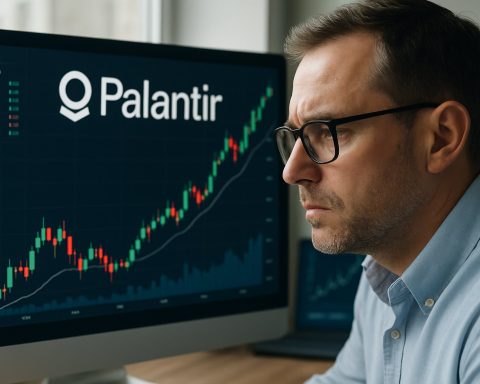- Global markets are disrupted by new tariffs, heavily impacting electric vehicle stocks and the Hang Seng Index.
- The Hong Kong Stock Exchange saw significant declines in EV companies like BYD, Nio, Xpeng, and Li Auto, with losses exceeding 10% amid trade tensions.
- President Trump imposed harsher-than-expected tariffs, adding 34% on top of a previous 20%, challenging Beijing.
- China responded with equal tariffs and blacklisted 11 major American corporations, escalating trade tensions.
- The current trade conflict reflects a shift in global economic strategies, where tariffs become tools of strategic economic warfare.
- China’s resilience is underlined by its robust domestic economy and strategic policy maneuvers, hinting at a potentially favorable future stock market trajectory.
- International trade dynamics are now pivotal in shaping industries, investment strategies, and governmental economic policies.
A fresh barrage of tariffs sent ripples through global markets, leaves the once-bustling electric vehicle (EV) stocks reeling as the trade tension between the United States and China spirals to unprecedented levels. The Hong Kong Stock Exchange bore witness to a stark reality on the trading floor. Investors, jittery and reactive, saw significant declines in the EV giants—BYD, Nio, Xpeng, and Li Auto—illustrating the delicate tango between global politics and market stability.
Amid the tumultuous cacophony of trade announcements, the shockwaves were acutely felt in the EV sector. BYD plummeted by 11.15 percent, Nio plummeted by 11.30 percent, while Xpeng and Li Auto followed closely, slumping 11.40 and 10.82 percent, respectively. These declines, seemingly minute in figures, mask a staggering loss in market confidence and billions in valuations, as the Hang Seng Index cratered by nine percent and the tech-centric Hang Seng Tech Index tumbled by over 11 percent.
President Trump’s hardened stance punctuated the air, as he declared harsher-than-expected tariffs. The United States’ volley of reciprocal levies, a whopping additional 34 percent, was his retort to the already strained economic canvas—the weight compounded by an initial 20 percent impost earlier this year. The reaction from Beijing was swift and unequivocal: tit-for-tat tariffs of equal magnitude, coupled with a blacklist of 11 major American corporations, effectively ostracizing them from the lucrative Chinese market.
In the swirling vortex of tariffs and countermeasures, a poignant evolution seems to surface in the global valuation paradigm. With geopolitical calculus increasingly dictating market destinies, a report by CICC aptly captures the essence of this tremulous landscape—a future where tariffs aren’t mere taxes but instruments of strategic economic warfare.
Reflecting on the historic trade skirmishes of 2018-2019 offers a glimpse into the future. While China’s immediate market tremors are inevitable, its ability to endure and adapt will burgeon from domestic economic fortitude and adroit policy maneuvers. Unlike previous years, China’s current market conditions hold a favorable hand, potentially nudging its stock market into uncharted territory despite the challenges.
As nations skirmish on the global stage, the takeaway becomes glaringly clear: the rhythm of international trade is no longer a mere backdrop to economic prosperity. Instead, it is the metronome against which industries, investors, and governments must calibrate their strategies, aspirations, and ambitions. With both superpowers entangled in this tariff-tango, the world eagerly watches the next act unfold.
Global Trade Wars: How EV Stocks are Taking the Biggest Hit
Understanding the Context
The recent escalation of trade tensions between the United States and China has had significant repercussions on global markets, particularly the electric vehicle (EV) sector. The imposition of new tariffs and retaliatory measures has sent shockwaves through the stock exchanges, with major EV companies in China experiencing substantial declines in their stock values.
The Impact on EV Stocks
1. Market Performance: The Hong Kong Stock Exchange saw significant decreases, with EV giants BYD, Nio, Xpeng, and Li Auto experiencing double-digit percentage drops. This dramatic decline is a reflection of market instability and decreased investor confidence.
2. Tariff Details: President Trump’s decision to impose an additional 34% tariff follows an initial 20% tariff earlier this year. In a counter-action, Beijing responded with identical tariffs and blacklisted major American corporations, disrupting their operations in China.
3. Historical Comparisons: The trade skirmishes hark back to 2018-2019, showcasing the cyclical nature of trade disputes and emphasizing the strategic use of tariffs.
Key Aspects & Industry Insights
How to Navigate the Turmoil
– Diversify Investments: With market volatility, having a diversified portfolio can mitigate risks associated with sudden market corrections.
– Stay Informed: Keeping abreast of geopolitical developments helps investors anticipate market shifts and make informed decisions.
Real-World Use Cases
– Localized Manufacturing: Some multinational companies are exploring localized production to avoid tariffs and maintain competitiveness in foreign markets.
– Strategic Alliances: Forming partnerships with local businesses can help companies navigate restrictive trade environments.
Market Forecasts & Industry Trends
– Shift to Domestic Markets: Companies might increasingly focus on domestic demand to counteract restricted access to foreign markets.
– Sustainability Initiatives: Firms may look to bolster sustainable practices to appeal to environmentally-conscious consumers, providing a buffer against economic downturns.
Pros & Cons Overview
Pros:
– Potential for Innovation: Trade tensions might spur innovation as companies seek new ways to reduce costs and improve efficiency.
Cons:
– Market Uncertainty: Increased volatility can deter long-term investment, impacting growth in the EV sector.
Future Predictions
– China’s Resilience: Historically, China has demonstrated the ability to adapt to economic challenges. Its focus on strengthening domestic policies could provide a buffer against external shocks.
– Strategic Economic Policies: Geopolitical pressures may lead to more strategic economic regulations aimed at stabilizing markets and encouraging growth.
Actionable Recommendations
– Focus on Long-term Trends: Despite immediate volatility, the fundamental growth trajectory of the EV sector remains strong due to increasing global demand for sustainable transportation.
– Engage in Policy Advocacy: Businesses may benefit from engaging with policymakers to influence favorable trade policies.
For more insights into global economic conditions and trade policies, you can visit Financial Times.
Conclusion
The intersection of geopolitics and market dynamics is reshaping the global economic landscape. As the US and China navigate their complex trade relationship, the ramifications for industries like the EV sector are profound. By staying informed and strategically adjusting to these changes, investors and businesses can potentially navigate this challenging environment more effectively.










